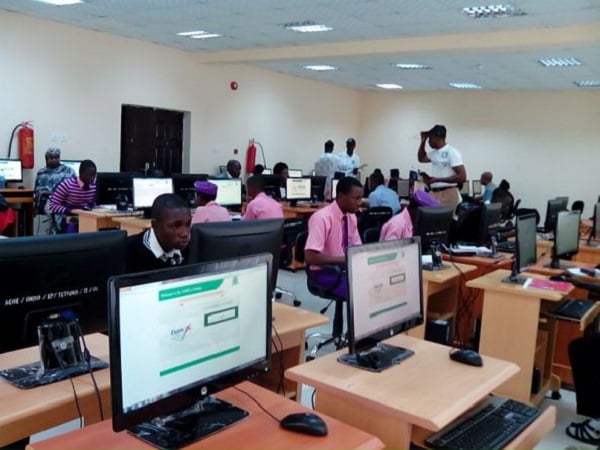Candidates share 'harrowing' experiences during 2023 UTME
The 2024 Unified Tertiary Matriculation Examination (UTME) of the Joint Admission and Matriculation Board (JAMB) commenced on Friday, April 19, and will end on Monday, April 29. 1, 985, 642 candidates have registered for the examination. That is significantly higher than the 1,595,779 candidates who registered for the 2023 edition.
Given the historical data and the stark reality of about 700,000 spaces available for admission, it’s clear that most of the 1,985,642 candidates who will sit for this examination will not secure any admission. Stear’s analysis reveals that between 2015 and 2019, not more than 35 percent of applicants were successful. The figures speak for themselves: in 2018, 1,653,127 applications were received (with 549,763 securing admission), and in 2017, 1,722,269 applications were received, of which only 566,719 candidates could secure admission.
Several factors explain this poor admission rate. Some are from the applicants, while others are based on institutional limitations from schools, JAMB, or the entire education system.
It’s disheartening to see young Nigerians continually facing the consequences of a system that restricts admission opportunities to tertiary institutions. We have created a funnel that narrows opportunities for young people. We should reverse this as soon as possible, and a change in the timing of the examinations can make a difference.
In Nigeria, students are expected to write two types of examinations before proceeding to Higher Institutions: qualifying and ranking examinations.
Qualifying examinations are the examinations that qualify a candidate for admission into tertiary institutions in Nigeria. WAEC and NECO are the two dominant ones. Ranking examinations test students and rank their performances. The UTME Of JAMB is a ranking examination. In a standard system, candidates should first get qualified and then proceed to the ranking.
Advertisement
The problem is that JAMB fixes its examination date earlier than WAEC or NECO. So, by design, JAMB ranks people who are not yet qualified. A considerable number of those who write the UTME are not qualified yet.
According to the NBS, 1.58 million students in 2019 took the West African Senior School Certificate Examination. Meanwhile, 1.53 million, 1.56 million, and 1,613,733 candidates sat for the West African Senior School Certificate Examination (WASSCE) for school candidates in 2020, 2021, and 2023, respectively. However, 1, 985, 642 candidates have registered for the 2024 UTME. While other private candidates write the WASSCE, more candidates are expected to write a qualifying examination than the ranking examination. How come more people are writing the ranking examination than the qualifying examination?
Using the 2022 admission exercise as a reference, 1,867,743 Candidates applied for the UTME and Direct Entry. However, only 1,234,674 had O’ Level results, and only 1,116,021 had the five credits, including English and Mathematics. So, over 40 % of the candidates who bought the UTME forms had no O’ Level results. So, JAMB ranked over 40 % of the candidates that were not qualified. Imagine that FIFA asked countries to play in the World Cup finals without playing in the preliminaries. Or can we have more teams at the World Cup finals than at the group stages or the preliminaries?
One of the most glaring issues with the current system is the financial burden it places on students and their families. JAMB profits from selling forms to unqualified individuals and fixes the examinations before they can take the qualification examinations. This practice not only undermines the fairness of the system but also imposes a significant financial strain on families. This needs to change for the sake of fairness and financial prudence.
Advertisement
We propose a reversal in the order of examinations to bring about a positive change. The sequence should be NECO, WAEC, and then the UTME. This shift will ensure that students receive the results of the qualifying examinations before being ranked by JAMB. For repeat candidates, it should be mandatory that only those who have passed NECO or WAEC and got the five credits, including Mathematics and English Language, be allowed to buy the UTME Form. They are already qualified, so they proceed with the ranking. It’s encouraging to note that the organizers of these qualifying examinations are now expediting the processing of the results. For instance, the results of the 2021 West African Senior School Certificate Examination, WASSCE for School Candidates, in Nigeria were released 45 days after the last paper was conducted. The National Examinations Council (NECO) also aims to release the results of the Senior School Certificate Examination (SSCE) to candidates within 45 days after the last paper is conducted. This change promises a fairer and Less stressful process for all students.
Another significant benefit of this proposed change is that students will have more time to prepare for the examinations. Currently, some Secondary schools struggle to complete the syllabus before the end of the second term of SS3. This change will give the schools more time to ensure that students are adequately prepared, potentially improving their chances of success.
There is no reason why JAMB cannot accommodate a change in date because the examination dates have been moved around. The 2017 and 2018 Unified Tertiary Matriculation Examinations were held in March and May, respectively. The examination was held between March 14 and April 4 in 2020, while the 2021 edition started in June. The 2022 edition was in May, and the 2023 edition started in April.
This change will make a difference. I call on JAMB and the regulators, including the Ministers of Education and the Ovesigh committees of the National Assembly, to consider this. It’s wasteful and needless stress for students to keep writing ranking examinations when they have yet to pass the qualifying examinations.
Advertisement
I wish all the students who are writing the examinations the very best.
Views expressed by contributors are strictly personal and not of TheCable.
Add a comment







